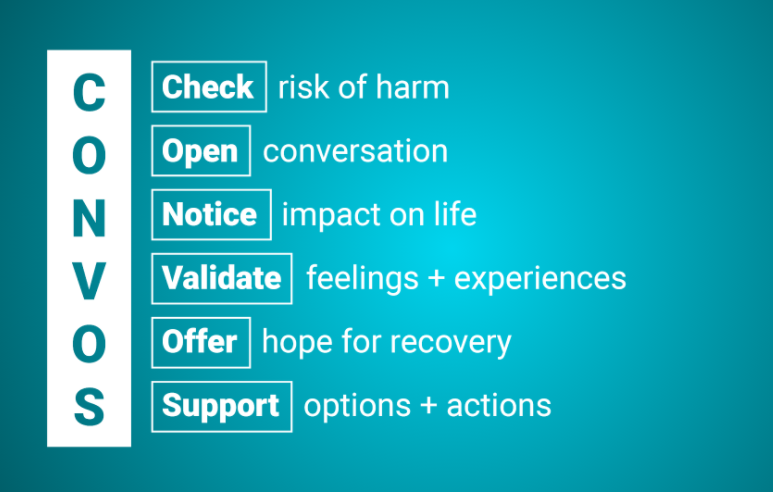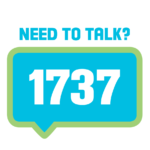Why complete CoLiberate’s
Mental Health First Response
Skills Training?
“Eye opening, empathetic and essential” – Liam Mancini (Garage Project)
Your confidence to carry out direct informal peer support conversations is what we care about.
We want to see a world where everyone has a trusted someone who can notice if they are struggling, and can reach out to start a caring conversation that helps connect them to support.
Mental health challenges can be complex issues, so CoLiberate’s simplified CONVOS framework helps you to stay focused on your first-response role, so that you can keep yourself safe and well while being the bridge that helps others over their barriers to getting support when they need it.
‘Mental Health First Response’ is CoLiberate’s new sister course to the flagship Mental Health First Aid (MHFRA) training previously delivered. Mental Health First Response (MHFR) is a concise, hands-on 1-Day training, which crystallises the first-aid role into six steps that you’ll discover you likely already know how to do!

If we’re going to leave the fear that has surrounded mental health conversations in the past, and address the skills deficit of everyday people in NZ when it comes to recognising distress and reaching out, we can’t be perfectionists about how these conversations go. Instead of seeking a textbook response to mental health challenges, we’re focused on helping you find your own way to say ‘I care about you, I can see that what you’re going through right now is really tough, so let’s work out what support could look like for you, because things can get better.’
The CONVOS framework is a foothold to reach for when you can see that someone is struggling, and CoLiberate coaches are here to help you find your own way to use it. That’s because the words that come most naturally to you are the ones you’re most likely to use in your real-life relationships! With a simple framework and the confidence to navigate it in the way that’s most comfortable for you, we believe everyone can be a trusted someone.
CoLiberate’s MHFR training is short and sharp – and that’s deliberate. When we followed some of our MHFAers into their workplaces to see what putting the skills into practice actually entails, we found that less can sometimes be more… If we focus less on our assumptions about what particular mental health challenge someone might have, and more on starting the conversation with the person directly, then we resist the temptation to diagnose someone inappropriately, act as their therapist or make our own decisions about what we think will most help. Instead let’s strengthen our relationships by showing we care, listening, and staying open to the idea that support looks different for everyone.
If you’ve got a hunch that your colleague is struggling today, or if you think your friend just doesn’t seem like their usual self right now, trust that hunch! You don’t need to know what the symptoms of depression are, or how to differentiate between stress and anxiety, to play a critical role in supporting your peers. Your hunch that something’s up is enough of a reason to find a moment to ask your colleague ‘how are things for you at the moment?’
If you can see someone might be struggling, but you’re frozen in the notion that you’re ‘not the right person’ for this, or that ‘someone else would handle this better’, you are not alone, and we can help.
Join us in making 2024 the year that everyday people in Aotearoa / New Zealand become an ecosystem of support. It’s time to show the people you care about that you don’t have to be a mental health professional to make a difference. It’s time to spread the word that you – yes you – with your slightly awkward way of ‘getting deep’ and your tendency to occasionally say the wrong thing altogether and end up backtracking and starting over – you are enough, you have enough skills, you can find good enough words, to reach out to someone who you think might be having a hard time.
Bop Murdoch (Co-Founder and MHFR Cheerleader)
“This course is an antidote and firm rebuke to anyone who still believes mental health is vague and hard to grasp. It breaks practical, useful tools into easy to grasp steps, and strengthens the entire team in the process.“
–George Daroux (Garage Project)




